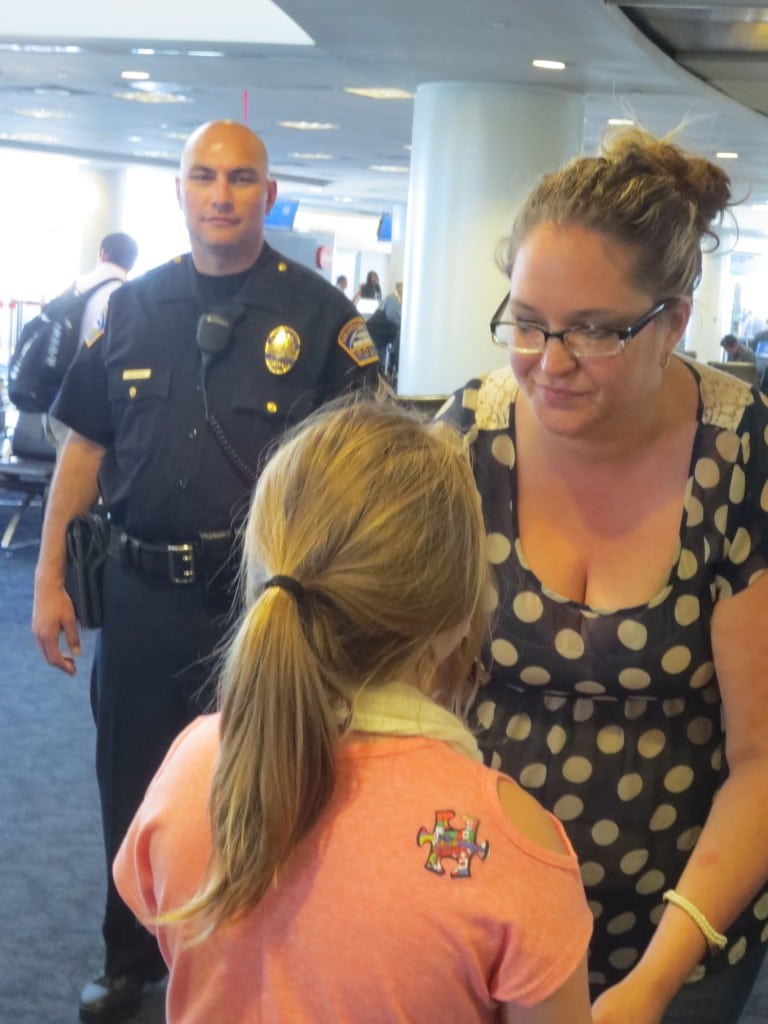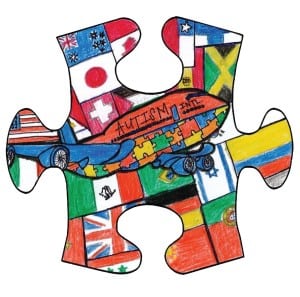
A parent talks with her child, who is wearing the new self-identification sticker for people with autism, while a law enforcement officer looks on. PHOTO COURTESY LOS ANGELES WORLD AIRPORTS
Larry Rollon thinks a lot about helping people of various abilities through the airport. As coordinator for disability services at Los Angeles World Airports (which includes LAX and Ontario International Airport), he oversees programs to assist passengers in wheelchairs, the hearing and visually impaired, and others who need help navigating the airport and getting to their flight.
But he hadn’t thought much about passengers with autism until about two years ago, when he started hearing from families asking about autism services at the airports. “We didn’t have any such programs,” says Rollon, who quickly started asking questions and looking for a partner who could help fill this need.
Haynes Education Center, a nonprofit organization dedicated to supporting children with special needs, offered to help. Haynes Director of Education Amy Deloera set up a meeting between parents of students on the autism spectrum and airport, TSA and airline employees. “It was quite an eye opener,” Rollon says.
The feedback gathered from these families sparked the creation of a program to train airport, TSA and airline personnel, and a new self-identification program for people on the autism spectrum.
Experts from Haynes Education Center now conduct three-hour training sessions four times a year for what Rollon calls the “airport community,” including airport and airline personnel, wheelchair service providers, workers from airport restaurants and shops, airport law enforcement, TSA, and U.S. Customs and Border Protection employees. The training includes:
- An explanation of autism,
- How to recognize autism,
- Discussion of issues that might come up for someone with autism during the boarding process,
- Warning signs that someone with autism is becoming overwhelmed and needs help,
- Coping strategies for evacuations and other emergency procedures, and
- Role-playing of situations and solutions.
Rollon says that 50 to 80 people participate in the training every month. “What we’re trying to do is educate personnel so they know what to look for,” he says.

This sticker is worn on the front and back of the shirt to help airport personnel identify people with autism.
Rollon heard from many families that law enforcement and other airport personnel, unaware of the signs of autism, often react harshly when a person with autism causes a disturbance. “Every person in the room [at Haynes Education Center] mentioned unfortunate experiences they’ve had with law enforcement,” he says. In response, in April the airport began offering a self-identification program for people with autism.
At the check-in counters of participating airlines – which currently include American, United, Copa, Air New Zealand, Southwest and Virgin America – families can receive a packet that includes two colorful stickers for each person in their party with autism. The two-inch stickers are worn on the front and back of the shirt, and indicate to airport personnel and law enforcement that the person has autism. If an incident occurs, trained personnel will recognize that it is likely due to autism, and will be ready to assist the family. “Instead of acting as if it is an enforcement matter, they will deal with the parent,” Rollon says. They will make it clear that they are there to assist, and help find a quiet area for the family until things calm down.
The stickers were designed by a group of students, ages 10-17, from Haynes Education Center.
In addition to these programs, the airport also now offers a year-round flight experience program for families with autism. Families receive tickets, go through screening, board the airplane and have lunch – basically experiencing everything except takeoff and flight. Rollon says the program will be opened to people with other types of disabilities beginning in October.
When making plans to fly, people with family members who have autism can:
- Visit the LAWA.org website for news about the latest Flight Experience Program,
- Contact TSA Cares at 855-787-2227 in advance, so that personnel can be ready to assist with security screening, and
- Participate in the autism self-identification program at the ticketing counter of participating airlines when they check in.
Not all airlines with flights in and out of LAX are yet participating in the program, and to Rollon’s knowledge, no other airports offer similar services. He is working to change that. “My goal is to make this universal,” he says. “Families should feel comfortable knowing that the airport and the airlines are there to serve them and to help them.”






































